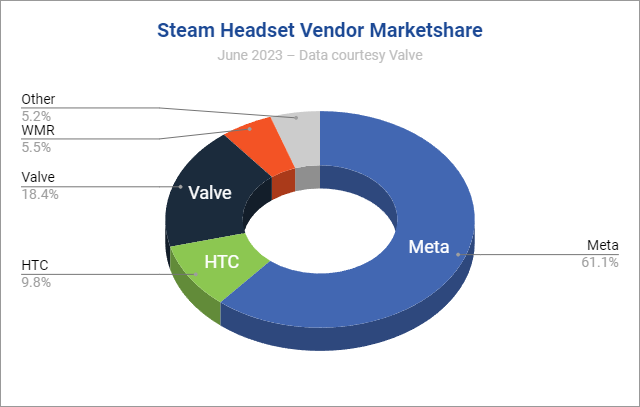Valve’s Index VR headset is now more than four years old. Despite its age, the headset continued to sell at a surprising rate over the years—but as they say, nothing lasts forever.
Valve launched Index with the goal of setting the bar for PC VR headsets to beat. And by many measures it accomplished that goal. Despite the $1,000 price tag and the headset’s age, Index remains the second most-used headset on Steam at 18.38% of active headsets on the platform (though a distant second to Quest 2 at 42.05%) as of June 2023. Even with just one headset, that makes Valve the second largest headset vendor on the platform.
Despite PC VR headsets that have launched since with higher resolution or OLED displays or even a cheaper price, the headset’s balance of comfort, visuals, sound, tracking, and controllers have made it a popular choice long after its spec sheet would suggest.
While usage of Index remains strong, sales of the headset appear to be in decline after years of holding steady.
Although Valve doesn’t share how much revenue individual products make on its platform, Steam does rank the top selling products, by revenue, each week. Thanks to SteamDB’s archive of the data, we’ve been able to get a rough trend of the headset’s sales performance over the years.
The data is at times sparse; for most of the dataset we only know the top 10 products by weekly revenue (if Index fell under the top 10 we don’t know exactly how far it fell), but Steam recently began sharing the top 100, giving us a clearer insight into the downward trend of Index sales.
The exact reason for the somewhat sudden change in trend is unclear, but we have one hypothesis. The downturn began happening some six to eight months after Valve released Steam Deck—the company’s first hardware product since Index. The turn also came around the new year heading from 2022 into 2023.
 Especially considering that actual usage of the headset remains strong, our best guess is that sales of Index have trended downward largely because Valve has shifted the spotlight to Steam Deck; possibly even more so after the company saw how well the device sold through the 2022 holiday season.
Especially considering that actual usage of the headset remains strong, our best guess is that sales of Index have trended downward largely because Valve has shifted the spotlight to Steam Deck; possibly even more so after the company saw how well the device sold through the 2022 holiday season.
While Valve had once promoted Index in various places on the Steam storefront, now Steam Deck appears more often to be put in front of Steam’s huge audience of users:
Valve may even have reallocated some of its Index manufacturing capacity to meet demand for Steam Deck.
Its difficult to say what this means for Index and Valve’s future VR hardware ambitions. There’s no doubt that the introduction of standalone headsets has changed the VR landscape considerably compared to when Index first launched. There have been glimpses that Valve is still working on something behind the scenes, but the company’s limited attention may be largely focused on Steam Deck for the foreseeable future.














